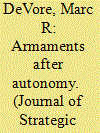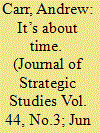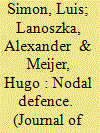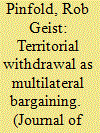| Srl | Item |
| 1 |
ID:
177991


|
|
|
|
|
| Summary/Abstract |
State investments in domestic defence industries are one of the most puzzling trends in international relations. Economists contend that these investments waste resources, while political scientists claim that armaments’ resultant overproduction fuels arms races. Why then do governments cultivate defence industries? I draw on cases from Israel, South Africa and Iraq to argue that the answers to these questions are distinct. Fears about supply security frequently spur states to begin developing arms industries, and elites’ techno-nationalist beliefs often sustain their defence-industrial investments. Defence industries’ primary national security value, however, lies in their hitherto unappreciated contribution to states’ military adaptation capacity.
|
|
|
|
|
|
|
|
|
|
|
|
|
|
|
|
| 2 |
ID:
177993


|
|
|
|
|
| Summary/Abstract |
What should a powerful patron do when a weaker protégé plans to launch a counter-proliferation strike against the nuclear facilities of a target country? This paper identifies three possible strategies available to the patron when handling a ‘trigger happy’ protégé. These strategies range from lending ‘tacit support’ to the protégé’ on the one end, to ‘intervention by exposure’, on the other end, where the raid is effectively sabotaged. Occupying the middle ground is a strategy termed ‘status quo adherence’, in which the patron attempts to warn the protégé against launching the raid, while simultaneously bidding to mitigate the protégé’s concerns by other diplomatic measures. By accessing previously untapped documents from several archives, the study uses the Carter administration’s approach to Israel’s growing agitation with the Iraqi nuclear programme to explore the strategy of ‘status quo adherence’ and its lessons.
|
|
|
|
|
|
|
|
|
|
|
|
|
|
|
|
| 3 |
ID:
177990


|
|
|
|
|
| Summary/Abstract |
Strategy is action in space and time. It is impossible to conceive of strategic behaviour outside of time, and the management of temporal factors plays a substantial role in determining the path and outcome of conflict. Yet time’s role in strategy has been empirically under-studied and theoretically neglected by scholars. This paper addresses this by identifying four constituent concepts of time for strategists: Order, Duration, Significance and Transition. The paper explores how each applies to and can improve our understanding of strategic behaviour. The paper concludes by outlining some of the promising avenues of policy opportunity and scholarly research.
|
|
|
|
|
|
|
|
|
|
|
|
|
|
|
|
| 4 |
ID:
177992


|
|
|
|
|
| Summary/Abstract |
Scholars and pundits alike continue to portray the U.S.-led regional alliance systems in Europe and East Asia in stark, dichotomous terms. Whereas the North Atlantic Treaty Organization is the standard model of multilateralism, the U.S.-led system of bilateral alliances in East Asia is the archetypal ‘hub-and-spokes’ structure in which different allies (the spokes) enjoy deep bilateral strategic ties with Washington (the hub) but not with each other. We argue that these common depictions of U.S.-led alliance systems are obsolete. Instead, we show that what we label ‘nodal defence’ – a hybrid category that combines overlapping bilateral, minilateral and multilateral initiatives – better captures how the U.S.-led alliance systems in Europe and East Asia operate today. Specifically, nodal defence is a hybrid alliance system in which allies are connected through variable geometries of defence cooperation that are organized around specific functional roles so as to tackle different threats. To show how nodal defence is an emerging central feature of the U.S.-led regional alliance systems, we conduct an original cross-regional comparison of how these alliance systems work, drawing on elite interviews, official documents, and secondary literature.
|
|
|
|
|
|
|
|
|
|
|
|
|
|
|
|
| 5 |
ID:
177994


|
|
|
|
|
| Summary/Abstract |
This essay tests competing scholarly approaches to territorial withdrawal in two cases seldom scrutinised by theorists: the Israeli exits from the Gaza Strip and southern Lebanon. The dominant framing of these cases as ‘unilateral’ suggests Israel withdrew without bargaining with actors in the international system. These cases therefore apparently illustrate the primacy of domestic politics in facilitating or precluding withdrawal. Yet, this essay delineates often-overlooked causal paths emanating from: (1) violent Israeli bargaining with the enemy and (2) diplomatic Israeli bargaining with third parties. Hence, this essay demonstrates withdrawal is dependent on bargaining with external actors, even in ‘unilateral’ cases.
|
|
|
|
|
|
|
|
|
|
|
|
|
|
|
|